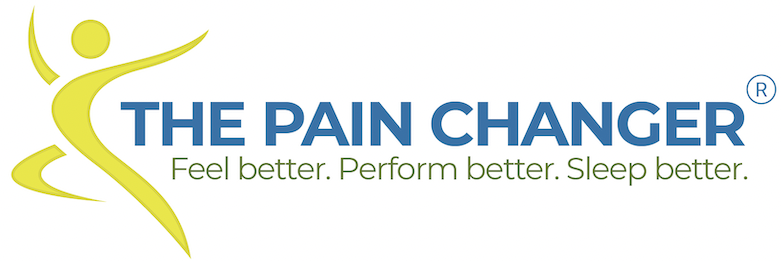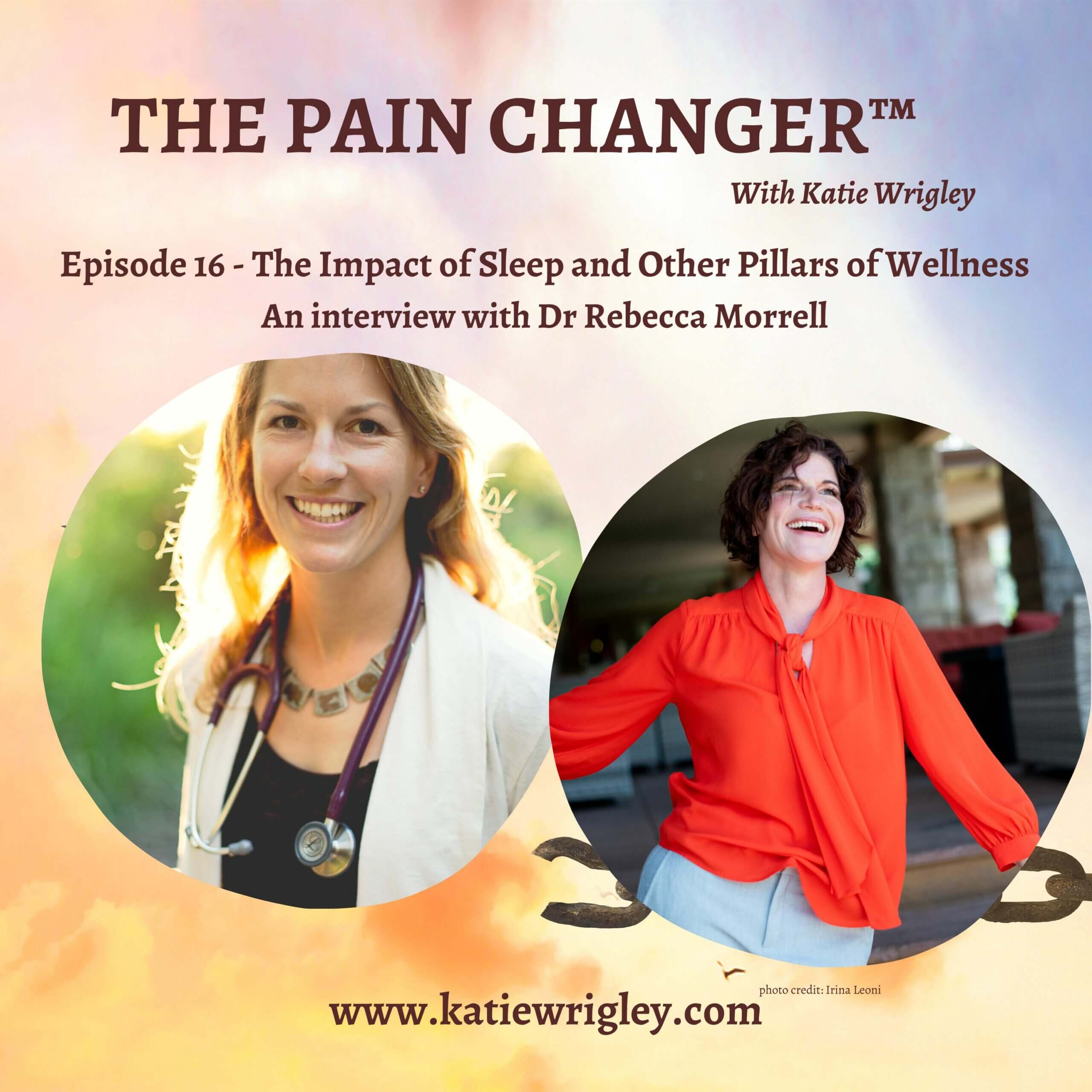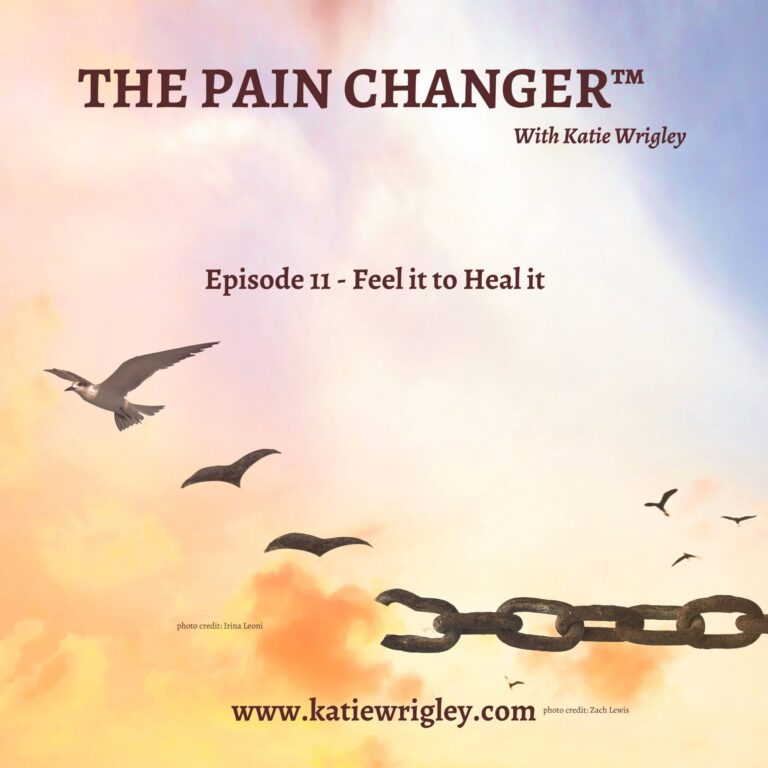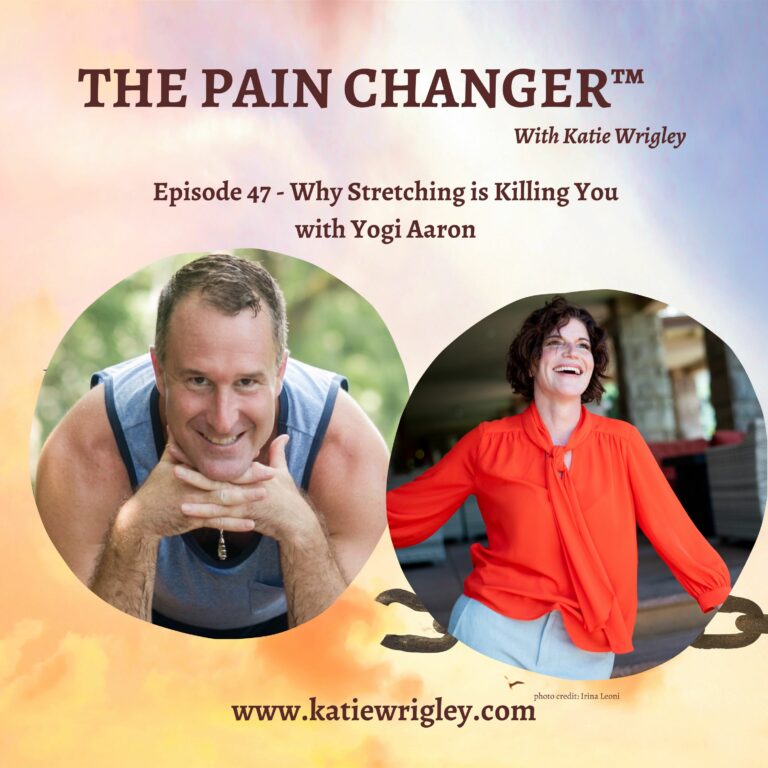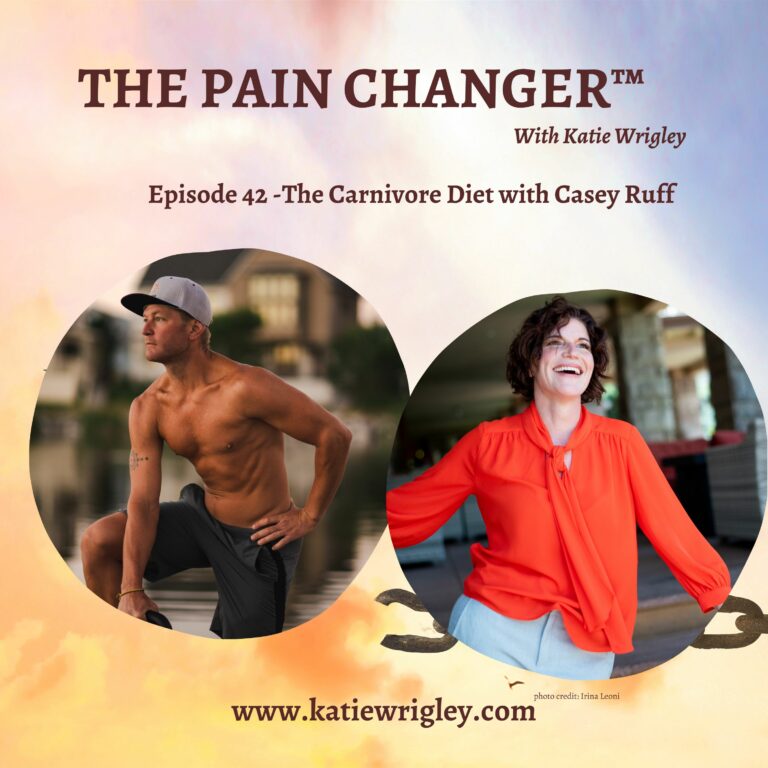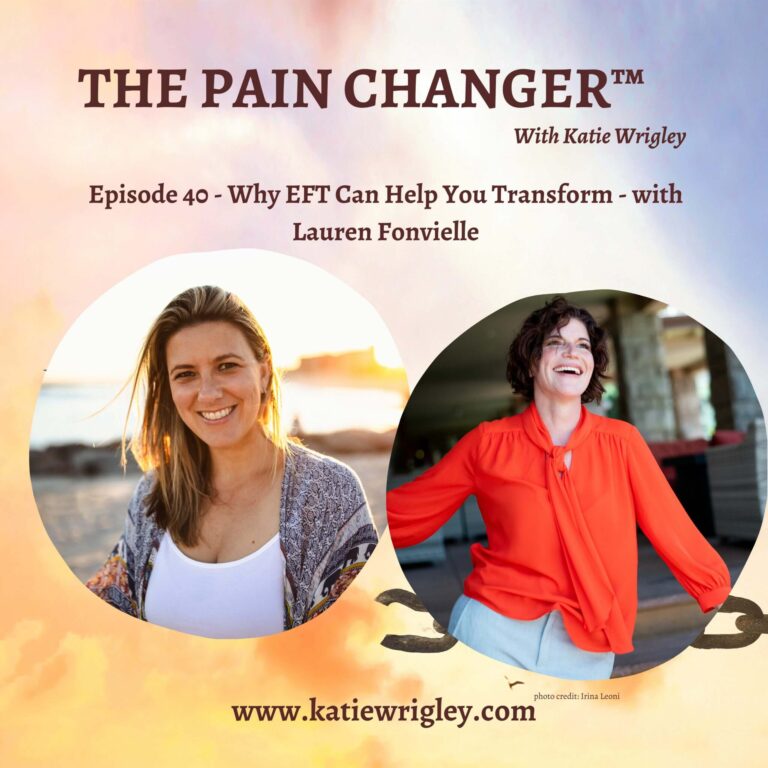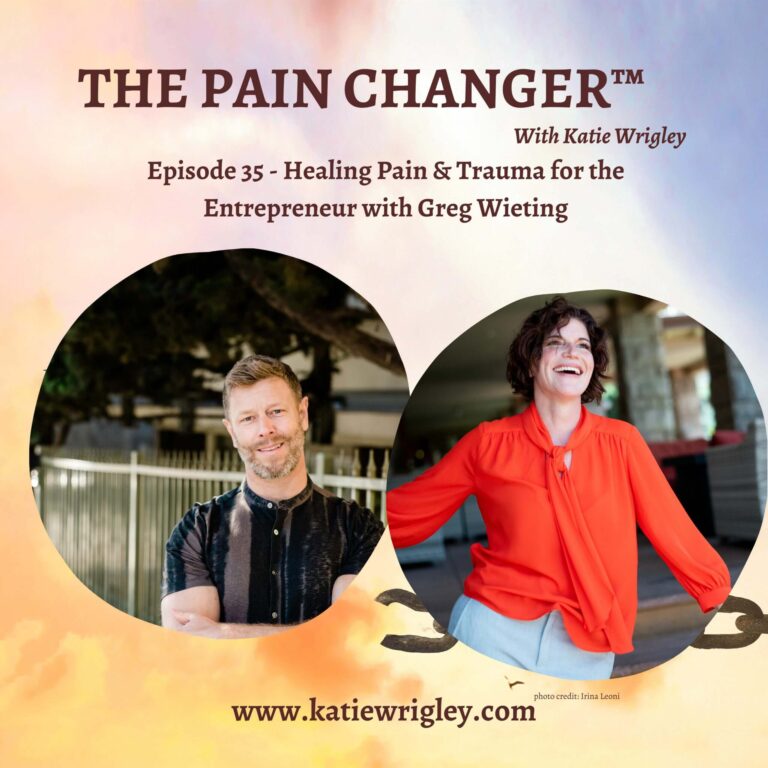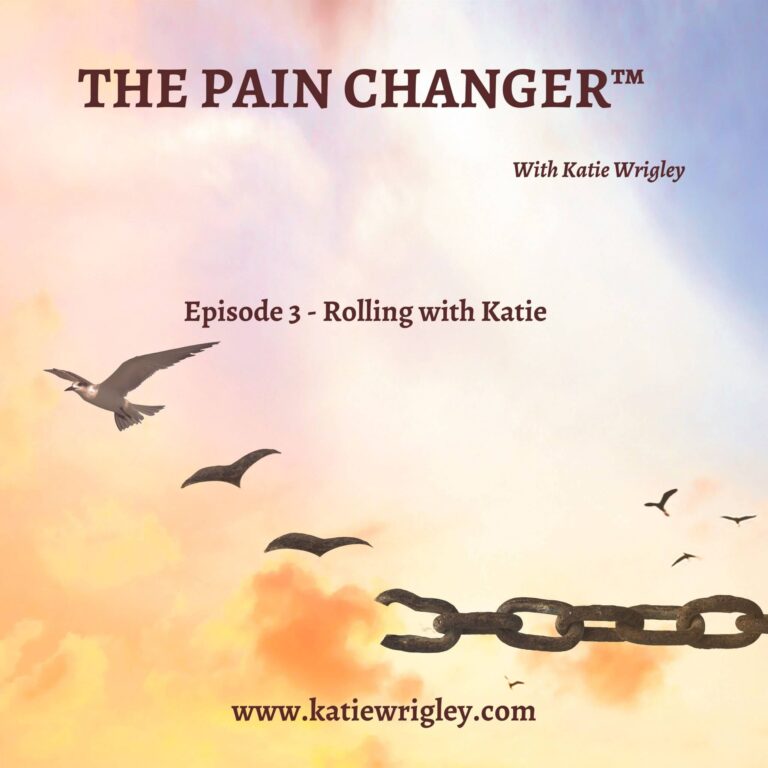Episode 17: Sleep and Other Pillars of Wellness
Transcript…
In this episode, you will learn:
Why sleep is so important and what is happening in your body while you sleep
Ways to start to incorporate wellness into your daily routine
The link between stress and pain
The link between emotional and physical health
Episode 17: Sleep and Other Pillars of Wellness with Dr. Rebecca Morrell
Katie: This is the pain changer Podcast, episode 17. Last week, we heard from my good friend Coral Simpson around the importance of diet when you’re dealing with any kind of chronic issue. This week, we’re going to have a chat with Dr. Rebecca Morell, a naturopath, doctor who’s going to be discussing the importance of sleep with chronic pain. That’s coming up next.
Thank you so much for joining me today. Dr. Morrell. So let me give you guys a little bit of background about Dr. Rebecca Morrow. She is passionate about her integrative medicine practice. Her specialties include emotional wellness, gastrointestinal health, autoimmune disease, women’s health, musculoskeletal conditions, and thyroid health. treatment modalities include herbal medicine, counseling, nutritional therapy, lifestyle modifications, hydrotherapy, physical medicine and when needed, medications. She sees adults and kids ages 12 and up she endeavors to get to the root of the cause of physical, mental and emotional illness. I love that. She recognizes the importance of treating the whole person, approaching healing with a holistic sense. She is a great listener and she wants you to lead your best life. Dr. Morell completed her undergraduate education at Wesleyan University with a BA in neuroscience and behavior. She received her degree in naturopathic medicine from Bastyr University in Seattle, Washington. She then completed a two year residency in naturopathic primary care in Shelburne, Vermont, after which she practiced neuropathic primary care in Burlington, Vermont. In her free time, Dr. Morrell can usually be found in the mountains or in the ocean with her husband. She loves skiing, biking and hiking. She also enjoys creative time, including yoga, painting and making jewelry. She is proficient in Spanish and has spent time abroad in clinics in Nicaragua and Guatemala. Wow, that is such an impressive background. Rebecca, thank you so much for joining me today.
Dr Morrelll: Yeah, thanks, Katie. Thanks for having me.
Katie: Yeah, I want to bring in as many practitioners as possible, especially those who listen, because that is the thing I hear over and over again when people come to me is they feel like the doctor that they’re gone to haven’t listened to and the audience has heard from Dr. McCloy already, you’re part of his practice as well. So would you be willing to share with the audience a little bit about what sparked your interest in medicine and more specifically focusing on holistic, natural medicine versus traditional.
Dr Morrell: Yeah, definitely. So I became a patient of a naturopathic doctor here in Maine, when I was 16, she had really helped my mom out a lot, who had kind of gotten the runaround from mainstream medicine and didn’t have a real clear diagnosis. And she was not feeling well. And she went to see a naturopath and she really helped my mom out a lot. So then I started seeing her. And I really liked the time she spent with me, you know, it didn’t feel rushed at all. And she really listened. You know, speaking of listening, she really cared. And it just felt kind of all encompassing, in terms of every part of me felt taken care of. So, you know, being a patient age 16 on, I wasn’t thinking then that I wanted to be a naturopathic doctor. But I’d had that experience. And then fast forward to college, I ended up doing pre med requirements. So I had an option to pursue medicine someday if I had wanted to, but I still didn’t really know. And then, a few years later, I had spent some time down in Nicaragua on a public health type of mission, and seeing the need there for education around health, folks, diabetes was rampant. And people didn’t know the connection, really, with soda and diabetes. And so education is one of the major tenants with naturopathic medicine. So that was what kind of drew me a little bit closer to seeing the need for education really, and not just in Nicaragua, obviously, you know, here too, in the States, because it can be really empowering for folks. Right. And being in Nicaragua, a really poor country, they didn’t have a great health care system, still don’t. But they would have herb gardens, at their homes, and they would be making salves and teas to help their kids and their families recover from illness. So I was really intrigued by the herbal medicine component, as well there. And so kind of putting those, what I was looking for, in terms of how I wanted to help folks, naturopathic medicine rang true, really and one of the other tenants is getting at the root cause of what’s going on with folks versus putting band aids on the issue. And that really resonated with me as well. So then I applied to a couple naturopathic medicine schools and ended up out at Bastyr in Seattle.
Katie: Nice. That’s a great story. And it continues to amaze me, both the amount of education that’s needed, because it’s, what you’re doing isn’t part of what we would consider “normal” with medicine. But I love that, you know, you felt really heard and seen, and that’s so important for all of us, especially those who are struggling with a chronic condition. A lot of times, you know, by the time I start to talk to someone, or they find me, they feel like they’ve been gaslighted. And all of that can be taken away by someone like you who’s going to sit there and listen to them and hear them and really understand and dive deep into what that person really needs to have some relief. So thank you for what you’re doing out there in the world.
Dr Morrell: Oh, thanks. I appreciate it. Yeah, listening is key in what I do, you know, every day, and I think, if a person feels heard, and nothing else in the visit, we’ve had a good visit, you know, they’re in the right direction towards healing.
Katie: I agree. I agree, that the awareness and being heard or to validate. Yes, yes. Like you are not crazy. Your pain is real, even if we don’t know why yet, it is real. And understanding that, you know, it may be created in the brain. That doesn’t make it less real. And I hate that. That idea you hear sometimes of “oh, it’s all in your head”. It is in your head. And I actually have an episode called that. But what that means is we have the ability to change it, it doesn’t mean that it’s not real. There is something in your body crying out for attention when we have these symptoms that are making us uncomfortable, or in some cases, excruciating amounts of pain.
Dr Morrell: Yeah, definitely.
Katie: So what happens to stress and pain when you don’t get enough sleep? Would you be able to speak a little bit about that?
Dr Morrell: Yeah. So sleep is very important for all of life’s functions, really. And if you’re not getting enough sleep, stress and pain tend to go up and they can go up a lot. When we rest and sleep, our body regenerates and recuperates really and helps decrease inflammation in our bodies. And inflammation is directly related to pain. And then stress is directly related with pain as well. So if we don’t get enough sleep, we’re hurting in those two areas: stress and pain.
Katie: Yeah, absolutely. I’ve experienced that myself, too. So you mentioned that while we’re sleeping, our bodies are getting some anti-inflammatory powers, what else is happening on our body that makes sleep so important, especially for those who are dealing with a chronic condition of some sort?
Dr Morrell: Yeah, so pretty much every system in our body is resting and recuperating, in a sense, and in getting prepared for the next day. So inflammation is less and we go more into our parasympathetic nervous system, our rest and digest nervous system, which pretty much just helps everything heal. You know, it helps with our genes in terms of fighting cancer as well. Because if we don’t get enough sleep, there has been links to, you know, increase rates of cancer, too. And pretty much causes disease.
Katie: And I’ve heard that as well. There’s big links between lack of sleep, as well as there’s some emotions that they’ve linked to cancer as well, like one of the primary ones I’ve read is, if someone’s holding a lot of resentment, which is very easy to do in this life, you know, it can be a struggle, sometimes it can be a challenge, especially if you don’t have the tools yet to be able to really vet out the people who are in alignment with you personally. And I hear that repeatedly. And there’s, I’ve also heard, and I’m curious, your thoughts on this, that there’s no way to make up sleep? Is that true?
Dr Morrell: Like, one from one night or more long term?
Katie: Like more from one night because I and I’ve heard myself say it so many times to like, “oh, I only got four hours of sleep last night? Oh, I’ll catch up on sleep tonight.” And then I’ve also heard there is no catching up on sleep. You either get it that night or you don’t?
Dr Morrell: Well, gosh, I am not by any means a sleep specialist. But my understanding is, if you don’t get a good night’s sleep, it’s not going to give you cancer, you know, and it’s not going to make, maybe it might make pain and stress worse the next day, but my understanding is you can catch up on it in terms of, you know, take a nap the next day or go to bed super early the next night. And you can, you know, you’re probably not going to recoup it in one night of good sleep, but it might take a couple or even a few and everyone’s really different in that sense. But my understanding is one night of not great sleep, I wouldn’t fret about it. And probably the fretting about it is going to make you worse off than actually the lack of sleep that night.
Katie: I really love that approach because you hit the nail on the head with ‘you start fretting that you’re not getting enough sleep’. And there’s one sleep expert out there. I’m blanking on his name, which is good. Because it’s really not important in this messaging here. But his whole thing is like oh, like I was paranoid after listening to him about not getting enough sleep. And then when I got an Oura ring, and I started to monitor my sleep, and I noticed exactly what you said: like if I didn’t get enough sleep the night before, but then I had an extra long meditation, or even not even a full nap but just got into a restful state, then my the Oura ring gives you a readiness score for the day. So getting more sleep, especially like actually didn’t matter at any point during the day, your readiness score gets boosted because now you’ve given your body some more rest. So I love that “don’t fret over one night”, it’s the overall you want to try to make a good effort, I think is what I’m hearing to get enough sleep. But if you don’t one night, it’s not the end of the world. You’re not a hop skip and a jump away from a cancer diagnosis.
Dr Morrell: Yeah, yeah. And I think that goes along with a lot of things in life too. You know, actually, diet wise, you know, folks who are trying to be gluten free, for example, and get a bit of gluten and you know, if they don’t have celiac disease but they’re really fretting about, oh gosh, I just had a little bit of gluten exposure, you know, again, that stress over that might be worse than the actual the little bit of gluten, so I talked to a lot of people about this in different areas of life really.
Katie: And I liked that approach of, Make your best effort with forgiveness, like, we’re not going to be perfect, we’re human, we’re not going to bat 1000 every day. Like, it’s just, that’s just not the way that we’re wired to be. And it’s going to vary, wherever we’re focusing is going to vary by whatever’s going on in our life, right? Like part of what I talk about, are the four areas of life where we can impact pain, which is mental, emotional, physical, and verbal, and physical, and actually sleep would fall into all of them. For me, you know, you got to have enough sleep so that your wires are working right in the morning to get the words out of your mouth that you intend instead of lashing out at someone because you’re cranky, because you didn’t get enough sleep. It definitely helps your mental and emotional state. And then physically, it’s so important for the recuperation of the body to be able to regenerate itself and heal again. And same thing, you know, with diet, whatever we’re putting in our body, we want to make a best effort. But what I found for myself, personally, my best effort is having one day of no rules for diet, and I’m actually less likely to eat stuff I shouldn’t eat. If I have that one day. I’m more likely to still eat really well. But like, “Oh, this is my cheat day, I can have a whoopie pie”, or whatever it is, you know, but it’s like one time a week. If I don’t give myself that, then I feel locked in and trapped. And when I do give myself that, I’m not nearly as likely to stray from what feels like the best diet for me. Same thing with sleep as well, is that latitude to allow ourselves to be human is really important for stress and pain.
Dr Morrell: Yeah, I love that. I think that’s a really healthy view on it and to have that experimental day of eating or whatnot. I tend to stay away from the word “cheat” just because there’s so much guilt with that, you know, so I always encourage: You have your experimental day, you know, see, see what, you know how things go with this experiment.
Katie: Yes, I’m going to start using that instead. Thank you. Because you’re right, the words are really important and “cheat” implies I did something “wrong”, whereas you’re having the experience of varying from your diet or varying from your routine and see what happens, you may not like it, you may find that you feel liberated, and it feels better, but the only way to find out is to try it. And all of that is okay. All of that is absolutely okay. And it’s important to give ourselves that space. So you had mentioned before a link between stress and pain, what have you noticed personally from your professional life, or actually, maybe from your personal life, too, but what have you noticed between the link between high stress and high pain, like how does that correlate in your patients?
Dr Morrell: Yeah, there’s a direct correlation. You know, higher stress equals higher pain levels. lower stress often leads to less pain. Not necessarily depending on the condition, but stress. I’ve never seen it help pain. It always hurts pain levels, unfortunately, yeah, for sure. Pretty stressful world these days. So you know, talking to folks a lot about how do you manage stress, you know, what do you do for self care? What, what do you do for your stress reduction modalities?
Katie: And what are some of those that you recommend to someone listening right now who is feeling like completely overwhelmed, like they are just about to snap because their stress is high, their body is really starting to ache? Maybe they’ve been dealing with pain for a while, but what would you recommend as a starting point to try to get their hands around that to give themselves some relief?
Dr Morrell: So a strict stress reduction modality. And it’s no one particular thing for everyone. It’s usually a conversation with folks about what would you like to do? Because I’m not going to tell someone to move their body if they hate moving their body, right. Although I will say that is key for reducing stress and depends on the condition but sometimes pain, you know, easy walking, or swimming or some light dancing can be helpful. And also helps sleep by the way so I think body movement can be good and I like using the word body movement and not exercise because a lot of folks have kind of a visceral response to that. I heard that might be negative. Not all folks, but some certainly do. But really, it’s so individualized. So, you know, I say, What about body movement? What about some type of self care, you know, whether it’s reading or cooking or art time, creative time or meditation? Meditation is often a biggie. And there’s a lot of thoughts about that. And there’s all different types of ways to meditate. I think a lot of folks don’t really realize that, you know, a walk in the woods by yourself, can be meditative, and can be a form of meditation that doesn’t have to look like what you might think of as meditation. Right? So those are just some ideas. But really, it’s a conversation of what do you want to do? What makes you feel good? And what do you want to do for stress reduction, but it’s taking some time for yourself? I was gonna say to online and to take a load off, really, and it can be whatever it can be watching TV, listening to music, talking with a friend, you know, those types of things, too, right?
Katie: Absolutely. And so what I would want to add to that is, you know, for anybody that’s listening, pay attention to your body. As you’re doing these things like before you sit down, if you’re taking a walk in the woods, or if you’re sitting down to watch TV, or if you’re calling your best friend on the phone, or maybe you’re having dinner with them. Just note the way your body feels as you’re doing these things, because that’s going to tell you the impact. You know, like, I noticed when I was disabled myself, I couldn’t. I couldn’t watch anything other than comedy on TV. Because if it was something stressful, my body would tense because I get so into whatever I’m watching. Like I just finished watching the series Ozark on Netflix, I couldn’t watch that four years ago. There’s no way! I remember really getting into like Stranger Things, I would have to pause after 15 minutes of an episode, because I’d get so riled up like, “oh, this hurts” like, no. But it’s it really helped me tap into A: where I was, you know, as far as physically and really start to understand and accept, like, “Hey, you’re, you’re not in a good state, right now you’re in your early 40s, you can hardly get off your couch, you can hardly function. Something’s Got to Give here, or this is what you’re looking at for the rest of your life.” And then it also became a measure of my progress, that I watched the whole series of Ozark and I didn’t have a pain flare. I don’t really have pain anymore, actually, from everything I’ve done. But it’s that awareness and taking in those exercises, those wellness routines, like you were talking about, acknowledging what you want to do first, and being okay with it. Like that is really key to it as well. Like I had a client I worked with for a while and she was having a time where she was really processing out a lot of stuff that had happened to her and she was doing deep emotional and mental healing, which as you know, really can be draining on your energy stores. So all she really wanted to do at night was watch Netflix. I said “watch Netflix, you are doing deep hard work right now you’re journaling, you’re meditating, you’re doing all these things, allow yourself that space.” And as soon as she allowed it, she got out of that lower energy time in a matter of weeks, she kept doing the work. And she felt like going back to her normal life again, but that the difference in stress level between her beating herself up for feeling like Netflix was beneath her and not a good use of her time. And not saying ‘okay, you know what? My energy is just so low right now that this is it for me’ and watching her make that transition and she says “Oh man, I feel so much better just seeing that this is what I want to do. Katie, thank you for that space to do so.” It’s like of course like this is what you need. It has nothing to do with anything I may think is relevant for me right now. This is about what you feel is best for you.
Dr Morrell: Yeah. And giving her almost that permission to not feel guilty about doing that.
Katie: Yeah. And have you noticed that with a lot of your patients that sometimes they just need permission? To be exactly as they are in that moment. However messy or however put together it feels just allowing themselves to be. Do you see that a lot too?
Dr Morrell: Yeah, I sure do because, you know, with our society, we just have so many built in preconceived notions of how things should be, how we should act, etc. So yeah, just giving folks the time and space and it’s okay to just be you, yes, I see that a lot.
Katie: Exactly. And, you know, you hit on something again there with “we should do this, we should do that”. There was a therapist I worked with for a very short time. But she introduced me to this idea of ‘should’ being actually a negative term because it implies that we’re not doing something that we quote unquote, “should” be doing that’s better for us, which means where there’s some sort of deficit that’s implied. And so I’ve started to call it shoulding all over yourself. And it’s, you know, what do you want to do in those moments? And allow it and don’t judge yourself for it? Right? Versus like, whatever you should be doing. You can should another day, but for today, be. Just be. See what happens? It’s another experience? Right. It’s another experiment. Just be and see what happens in your day.
Dr Morrell: I love that. Yeah. And trying to remove that self judgment piece. Just a hint at first, you know, I think can be really powerful.
Katie: Yeah, absolutely. And I love watching what people do when they’ve given themselves permission to be themselves, like, it just unlocks this whole world that they didn’t even know they could have.
Dr Morrell: Yeah, that’s very transformative
Katie: Absolutely. So actually, I want to spend a little bit more time with stress, pain, emotional, health, physical health, because that’s one of your areas of expertise is with the emotional health components as well. So, again, what have you seen a correlation with emotional or mental health and physical health?
Dr Morrell: Yeah. Well, they can be directly correlated, you know, a lot of physical symptoms can be brought about by poor mental health. And if you’re not feeling well, in terms of you’re feeling stressed out, you’re feeling down, you’re feeling anxious, you’re probably going to have more physical symptoms than if you weren’t. So again, kind of direct correlation. With, you know, mental health is worse, probably physical health is worse as well. If mental health is better, probably physical health is better as well. I saw a patient just last week, actually, who has a lot going on physically, a lot. And I was amazed and impressed and astounded at how well her mental health seemed, and how the lens she was looking at life out of was so positive still. And I commented on it and said, “This is keeping you alive and functioning. And don’t lose this, because this is gold, you know?” Because they’re so connected, and how could they not be right?
Katie: Right. And it’s, my primary care actually said, she’s now left the state, but one that I was seeing a while ago who’s allopathic. She was who I saw when I first came to Maine, and I was in a massive six week pain spike from driving 2600 miles on my own in the middle of a pandemic with two cats, no stress at all there. And much to your point, like my mental state wasn’t in the best place, I had just moved. You know, that’s very disruptive. No matter how much we want the move, no matter how good we know that it’s going to be for us, it’s still very disruptive for us to be in that state of transformation. And as a result, I had a massive pain flare, which the timing of that was beautiful, because it led me to cognomovement and this massive shift that I made in life, but to endure it at the time, it was pure hell. And so she watched me going from, I was never a pill seeker. I know that I’m an addict. So I was very, very aware of any substance I was using, but I was really reliant on muscle relaxers at that point, because I don’t tolerate NSAIDs or Tylenol or anything like that. And the natural stuff that I was trying to take for inflammation, I was just, my pain was too high to notice any kind of impact whatsoever, and it was just excruciating. And so I was asking for muscle relaxers at the maximum dose that was safe to take in a day. They wound up giving me a steroid pack or something but she had as she watched me make that transformation from feeling like I was a victim of my own body to the next time she saw me after my first cognomovement session was completely flipped on its head. And she was like, “wow, like you’re a completely different patient now than the one I met. And this mindfulness that you have, this is how two people can have the same MRI and a completely different prognosis because of the way that you are approaching this. Like whatever you do, hold on to that. Do not let it go.
Dr Morrell: Yeah, that lens is so important. And it can be just a little shift of the lens, you know, to be more excited about something versus stress about something that is just a little fine continuum right there.
Katie: Right? Yeah. And it’s, you know, and I’m so grateful that I’ve gotten to a point now where I don’t have to put things in my body that damage it, you know, like there’s a mixed bag around steroids. I’m not an expert on it. I just know overall, it’s, they’re not the healthiest thing for you. But they do knock out inflammation in severe cases. And I mean, I still remember I was probably at like an eight or nine of pain every single day couldn’t sleep through the night, I couldn’t walk very far, because I was still having really bad nerve pain and nerve damage, where when the inflammation got really bad, it almost felt like I was like throwing my left foot out in front of me to walk because it was so inflamed that I couldn’t really control the muscles the way I normally could. And then that led to fear. And fear and pain are like the quintessential mean, girls: they love to play together.
Dr Morrell: Mm hmm. Yeah, bring you out of that pain cycle was it? You mentioned the cognomovement. You feel like that was the key in terms of helping bring you out there?
Katie: That was one of the missing links. There were so many pieces, I started to just pull up all my tools with that spike. So I had the pharmaceuticals, I still needed that at the time. And I let go of judgment, like we were talking about for myself, and really started to dive into my meditation practice, and started to really dedicate more time to like what emotions make me feel the best? Love, joy. So I started this meditation where I’d start at my feet. And I would think I love my feet, work my way all the way up my body. And I would usually fall asleep by the time I got to my belly button. Like it would just help me relax. And I’ve noticed as I did that, my pain was going down. So my calmness is interesting. Okay, so then I just whenever I started to hone in, pain was going down. Yeah. Isn’t that amazing? It is, it really is. But again, it’s that awareness. And so the things that I’m really big on in my own practice are awareness and empowerment, you don’t have a choice until you’re aware that you have a choice. And then once you have a choice, now you’re empowered to do whatever you want with it, you can keep whatever is going on, that’s your choice. Or you can change it, and it’s up to you. Whatever rate you want to change it at. I mean, all of that is completely up to you. So those are, the really big key is to be aware of what’s going on, be able to face it with curiosity, not judgment, because judgment is just going to keep you there. Curiosity is going to be like, Wow, I really did that. And oh, okay, not proud of it. Maybe next time, I’ll do it this way. Forgive yourself, ask forgiveness if someone else is involved. But yeah, that’s that cognomovement at that point in my life really helped. But it was, it’s never one thing. There is never a silver silver bullet, especially when you’re talking about a chronic condition that’s been going on for years or decades. There’s no silver bullet. It’s a combination and awareness to see which one is helping you the most.
Dr Morrell: Yeah, I agree.
Katie: You know, you had mentioned earlier that with wellness, you really ask people what they want to do. And it really varies like some people you know, and I talked to someone a while ago who has a child who has ADHD and meditating…meditating, sets him off. But an active meditation getting him to move, just allowing him to move, that relaxes him, that down regulates his body, because of the way that his brain is wired. Movement is going to be what relaxes him. Sitting him still is awful for him so much to your point.
Dr Morrell: That’s a great example of different types of meditation. It’s not a one size fits all, for anything, either, like Qi Gong, or tai chi or something like that in terms of like a meditative movement, especially for a kiddo to keep their focus.
Katie: Yeah. And that’s what it comes down to is he’s got a hard time focusing. You know, that’s the premise of ADHD is you have a hard time sitting still, it’s a hard time focusing. It’s nothing wrong with you. You’re just wired differently, which means you’re going to have a different way to bring yourself some relief. There’s nothing wrong with it. It’s just a different way than what other people are dealing with. Yeah. So what would be going back to sleep specifically, again?
Dr Morrell: Sure.
Katie: What do you recommend? I know you said you’re not asleep, expert. And I want to acknowledge that there. But are there any tips for sleep hygiene that you could provide to listeners?
Dr Morrell: Yes. Lots. Where to begin? Um, well, in terms of amount, studies have really shown seven to nine hours are going to be the most beneficial for pretty much all health concerns. And I even like to recommend the upper end of that. So like eight to nine hours. And there definitely have been studies showing some people don’t need that much. But that’s the minority. Certainly the minority. So in terms of amount, that’s what I like to recommend. And then be careful with stimulating substances. So caffeine is a biggie, right? And so, so is nicotine, so is alcohol. That not to even mention medications or whatnot. But those are biggies in terms of, you want to make sure you’re having your caffeine earlier in the day. And if you have later caffeine, I’d say ideally, stop it before 2 or 3 pm. Some folks are sensitive and they need to stop and even sooner, you know, like noon or something like that. It’s very individualized there. And alcohol really disrupts sleep. Yeah, unfortunately. So, careful with that. And I would say limit that, if you’re having trouble sleeping, do a trial period of no alcohol and see how you sleep. Also, make sure the sleep environment is conducive to sleep. So often, that is, that it’s dark and cool. And not, not other noises. Some people like to use, like a sound maker or fan or something like that for some white noise. And I think that can be helpful if it’s a partner who’s loud sleeping, I think that can be really key in trying to calm the mind before sleep is key as well. So and a lot of people mentioned screen time. And I totally agree, ideally, no screen time, two hours before you want to sleep. Which is tricky. I know because a lot of people use TV or reading on a device as a way to wind down. But it’s not ideal because the lights can be stimulating to the brain. So reading or meditating or talking with your partner can be really key in terms of trying to turn down or sorry, turn up. Yeah, turn down the sympathetic nervous system that runs from the bear nervous system and get more into that rest and digest, chill out nervous system. What else, sleep schedules can be really important to try to stick to a routine in terms of, for example, going to bed around 10. And waking at seven every day, and even staying up late and sleeping in on the weekends can throw you off so that that sleep schedule is going to be key as well and try your best to maintain. And if you’re not getting enough sleep, and I’m okay with napping, sure. But ideally before 3pm in the day, because if you take a nap after 3 that can throw off your next night’s sleep. And I would also recommend not eating a big meal before bedtime. So a smaller snack would be fine. But you want to have dinner I would say at least two hours before that time. Then a hot hot bath or hot shower can be really calming before bed to help get us in that restful sleep mode. And a lot of medications including sleep meds, I don’t think are great for sleep because they can certainly throw things off. So be careful with those and those are going to be kind of more on an individualized basis. You know, is this affecting sleep? That makes sense. Some ideas that come to mind.
Katie: Yeah, These are great ideas. So just to recap, so if someone does want later afternoon caffeine because they feel like they’re dragging, try to cut it off by 3pm. Same thing with napping if you decide to nap versus have more coffee or tea, wake up by three so that it’s not interfering. And then make sure any large meals you have are at least two hours before bed. Super, super succinct nutshell there. You had mentioned the screen time. So I’ve experienced that myself. How effective do you feel blue light blockers are for people who are really like, maybe they don’t have physical books, maybe they only have a device? Or maybe watching TV? Yeah. Do those help? In your experience?
Dr Morrell: A great question. I don’t really know. I haven’t seen the research on those. So I’m not and I haven’t talked to a lot of folks, you know, patients wise, who use them and give me reports back. So I don’t have a good sense of that. My general sense would be they certainly wouldn’t hurt. And they may help. But I would just say, take note of Well, are you able to fall asleep better use? You know, using one versus not? And are you able to stay asleep? But yeah, sorry, I don’t know more of the research on that.
Katie: And I think the research is still coming out, you know, there, it’s a pretty new thing that we’ve only had around for a couple years, it’s gonna be a while until we really see the impact. But that’s where the placebo effect can work in our favor too right now, even without empirical data to back something up if we think it’s going to work. Yeah, a lot of times it’s going to work. I use them. And again, I’ve let go of I don’t care what the research is around it. I feel like I fall asleep better if I wear the blue light blockers. Like I was watching, I turned on the TV for about a half an hour before bed last night planning to watch a whole episode. And I had my blue light blockers on and I was falling asleep watching TV. And I conked right out and I slept for almost nine hours. And I was asleep at 9pm.
Dr Morrell: So yeah, so that works for you it sounds like, and that’s all that matters.
Katie: Really, you know, it’s working. And I don’t care if it’s validated or not. So I had to let go of needing proof. And on times when I’m over at my boyfriend’s house, I won’t have my blue light blockers and I always think I have a harder time falling asleep. I have no idea if it’s true or not. But I’m so attached to these working, that that’s the difference I notice.
Dr Morrell: Yeah. Are they glasses you wear or what? What form do you have?
Katie: Yeah, so the ones I’m wearing now. And even though this is just audio for the audience, these have some blue light protection in them, but they’re like a $10 pair that’s constantly smudged and cracked and all that that I got off of Amazon, but they are actual glasses but you can put like a film in front of your screen like I’ve got I’ve got another one over. Do I have it on this monitor? No I don’t, but I have one on my laptop. And again, I have no idea if there’s any validity or not. But it makes me feel better to have them with my awareness around brain health, and just in general, you know what blue light is doing to our brain and our thinking process. You know, it is really disruptive. And it is and then if you’re looking at social media on there now you’ve also got that emotional uptick that’s going to stimulate your brain because you’re going to see something that triggers you because social media is designed to trigger you and to have you react. You start reacting before bed you’re not going to be falling asleep very easily.
Dr Morrell: Yeah, that would be a good one to add to my list is no social media.
Ever for mental health. I don’t know if folks are willing to go there but I don’t think it’s good for mental health.
Katie: No, definitely not. It’s very…that’s a whole other topic for another episode. Because that’s the impact of social media with our physical, emotional, mental health is… that’s more than one episode. Let’s be honest.
Dr Morrell: Yeah.
Katie: This has been an awesome conversation. I thank you so much for joining us today. If there was one thought or one piece of advice that you want to leave people with today, what would that be as far as what we were talking about sleep, wellness, overall health?
Dr Morrell: I would recommend, I would say self care is key for a long, healthy, happy life and I would say try to implement something that brings you joy, whether it be five minutes or having a cup of tea in the morning, something quick can be fine. But try to find some self care routine that works for you that you can do for the long term. And I really think that’s going to have a positive effect on your life for the long term.
Katie: Nice. I love that. Something you enjoy and at least five minutes of self care that you integrate into a day. That is a great note to end on. Thank you so much for joining us.
Dr Morrell: Thank you, Katie. Appreciate it was a pleasure chatting with you.
Katie: Before we go today, Dr. Morrell can you please let people know where they can find you if they want to work with you and have a doctor listen to them?
Dr Morrell: Yeah, sure. So I am at the Integrative Health Center of Maine in Cumberland, and doing in person and telemedicine visits as well. My website is sageintegrativemaine.com. So again, sageintegrativemaine.com.
Katie: Great, thank you very much, and I will make sure that those are in the show notes. So you can find Dr. Morell again at Integrative Health Center of Maine and also at SageIntegrativeMaine.com. Both of those links will be in the show notes so you can reach out to her if you’d like to work with her. Thank you again for joining me today.
Dr Morrell: Yeah, thanks, Katie. Have a good one. You too.
Katie: All right. So I hope you guys enjoyed this episode. Thank you for joining us today. Next week on the pain changer. I’m going to be talking about patterns with both diet and sleep that tend to come about as a symptom of trauma. I hope you’ll join me again next week to take a deeper dive
